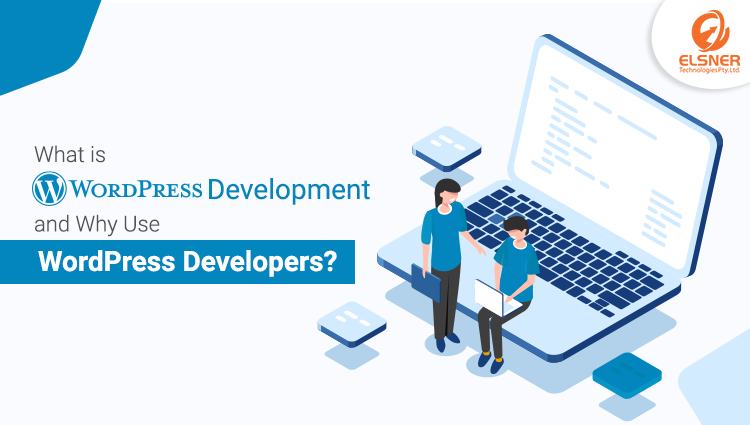Have you ever wondered what makes some websites so easy to manage and customize? Chances are, it’s thanks to WordPress! As one of the most popular content management systems (CMS) out there, WordPress powers over 40% of all websites on the internet. Whether you’re a blogger, small business owner, or large enterprise,
The Origin and Meaning of WordPress

So, where did the name WordPress come from? Well, it’s actually a blend of two words: “Word” and “Press”. The idea was to create a platform that allows users to easily publish and manage content, much like printing words on a press. The project was started in 2003 by Matt Mullenweg and Mike Little. They envisioned a simple yet powerful tool that democratized content creation, making it accessible to everyone, from individual bloggers to large organizations. Interestingly, the name also hints at traditional printing presses, emphasizing the platform’s core purpose of publishing and dissemination of information. Over time, WordPress has grown from a basic blogging tool to a full-fledged website builder, but the essence of its name still reflects its original mission—empowering users to publish their stories and ideas with ease and confidence.
3. Features and Benefits of Using WordPress for Websites
If you’re thinking about building a website, it’s hard to ignore how popular WordPress has become. It’s like the Swiss Army knife of website creation—powerful, flexible, and user-friendly. So, what makes it so appealing? Let’s break down some of the key features and benefits that make WordPress a top choice for both newbies and seasoned developers.
Ease of Use
One of the biggest draws of WordPress is how simple it is to get started. You don’t need to be a coding wizard to create a beautiful website. Its intuitive dashboard allows users to add pages, blog posts, images, and more with just a few clicks. This ease of use means you can focus on your content and design rather than wrestling with technical details.
Customizability and Themes
Want your website to stand out? WordPress offers thousands of themes—both free and premium—that you can customize to match your brand or personal style. Whether you’re creating a portfolio, an online store, or a blog, there’s a theme that fits your needs. Plus, with a bit of tweaking, you can modify layouts, colors, fonts, and more to make your site uniquely yours.
Plugins and Extensions
Imagine adding new features to your website as easily as installing an app on your phone—that’s what WordPress plugins do. With over 50,000 plugins available, you can integrate everything from contact forms and SEO tools to social media sharing and e-commerce functionalities. This modular approach allows your site to grow and adapt over time without starting from scratch.
SEO Friendly
Getting found on Google is crucial, and WordPress makes it easier. It has built-in SEO features and supports plugins like Yoast SEO that guide you to optimize your content effectively. Plus, clean code and fast loading times contribute to better search engine rankings, helping your website attract more visitors.
Community and Support
WordPress boasts a vibrant community of developers, designers, and users who are always ready to help. Whether you need troubleshooting advice, tutorials, or just want to see what others are building, there’s a wealth of resources online. This community support makes it easier to resolve issues and stay updated with the latest trends.
Cost-Effective Solution
Most of WordPress’s core features are free, and you can find affordable themes and plugins to extend your website’s functionality. This makes it a budget-friendly option for startups, small businesses, and individuals who want a professional-looking site without breaking the bank.
4. How WordPress Has Changed the Web Development Landscape
When WordPress first launched in 2003, it was mainly seen as a blogging platform. Fast forward to today, and it’s transformed the entire web development scene in ways that are hard to ignore. Let’s explore how this platform has reshaped the way websites are built and managed.
Empowering Non-Developers
Before WordPress, creating a website often meant hiring a developer or learning complex coding languages like HTML, CSS, or PHP. Now, almost anyone can set up a professional-looking website thanks to WordPress’s user-friendly interface. This democratization means small business owners, artists, and hobbyists can get online quickly and affordably.
Lowered Barriers to Entry
Thanks to its open-source nature and vast ecosystem, WordPress has drastically lowered the barriers to entry for web development. You don’t need to be a tech expert to launch a site. All you need is a domain, hosting, and a bit of time to customize your site. This accessibility has led to an explosion of websites—from personal blogs to online stores—around the globe.
Shift Toward Content Management
Before CMS platforms like WordPress, updating website content was often a cumbersome process requiring technical skills. WordPress popularized the concept of easy-to-use content management systems, making it simple to keep your website fresh without technical help. This shift has encouraged more frequent updates, better content, and greater engagement.
Enabling Small Businesses and Entrepreneurs
With its affordability and flexibility, WordPress has empowered small businesses and entrepreneurs to compete online. They can create customized sites, add e-commerce features, and optimize their content for search engines—all without huge upfront costs. This has leveled the playing field, giving smaller players a fighting chance against larger corporations.
Fostering Innovation and Creativity
Thanks to its open-source framework, developers worldwide contribute plugins, themes, and improvements. This collaborative environment spurs innovation, meaning new features and integrations are constantly emerging. As a result, users benefit from cutting-edge tools and creative solutions that keep their websites fresh and competitive.
Influencing Other Platforms
WordPress’s success has inspired countless other content management systems, but it remains the dominant player. Its modular architecture and community-driven approach have set a standard in web development that others strive to emulate. Even platforms like Shopify and Wix have integrated WordPress-like features, highlighting its influence on the industry.
Overall, WordPress has not just changed how individual websites are built; it has reshaped the entire landscape of web development, making it more accessible, flexible, and innovative than ever before. Whether you’re a hobbyist or a professional, understanding its impact helps you appreciate why it continues to be a vital tool in the digital world.
5. Popular Websites Built with WordPress
When you think of WordPress, the first thing that probably comes to mind is its incredible versatility. It’s not just for small blogs or hobby sites — some of the biggest and most well-known websites in the world run on WordPress. This showcases just how powerful and adaptable the platform is, regardless of the site’s size or purpose.
Let’s take a look at some of the most famous websites built with WordPress:
- The New York Times: Yes, one of the most iconic news outlets in the world uses WordPress for its blogs and certain sections. It’s a testament to how WordPress can handle high-traffic, content-rich sites.
- BBC America: Their site is built on WordPress, making it easier for them to publish news, shows, and updates quickly and efficiently.
- TechCrunch: This leading technology news site relies on WordPress to manage its extensive content, allowing for easy updates and content management.
- The Walt Disney Company: Their corporate website and some of their branded pages leverage WordPress, showcasing its enterprise-level capabilities.
- Bloomberg Professional: This financial news giant uses WordPress for some of its online content, demonstrating how the platform scales to suit professional and business audiences.
What’s really impressive is that these websites span various industries — from news and entertainment to finance and tech. They all benefit from WordPress’s flexibility, extensive plugin ecosystem, and ease of use. Whether it’s a simple blog or a complex corporate portal, WordPress’s architecture allows developers and content creators to build and manage sites efficiently.
Of course, not every website needs to be a giant media outlet, but these examples highlight that WordPress can handle high traffic, complex features, and a polished user experience. That’s part of why it remains a top choice for many organizations around the globe.
6. Future Trends and Developments in WordPress
Looking ahead, the future of WordPress is both exciting and full of potential. The platform continues to evolve rapidly, driven by a vibrant community of developers, designers, and users who are always pushing for better features and functionality. Here are some of the key trends and developments we can expect to see in the coming years:
1. More Focus on Block Editor (Gutenberg)
The Gutenberg block editor has already transformed how users create content in WordPress. Moving forward, we can anticipate even more enhancements that make editing more intuitive and flexible. Expect to see:
- More customizable blocks for diverse content types
- Improved drag-and-drop interfaces
- Greater integration with third-party plugins and themes
2. Performance and Speed Optimization
Website speed is more critical than ever, especially with search engines prioritizing fast-loading sites. Future updates will likely focus on:
- Core improvements to reduce load times
- Better caching and lazy-loading capabilities
- Enhanced compatibility with Content Delivery Networks (CDNs)
3. Increased Emphasis on Accessibility
Making websites accessible to all users, including those with disabilities, is gaining importance. WordPress is already working toward this goal by:
- Refining themes and plugins to meet accessibility standards
- Providing better tools for accessibility testing within the platform
4. Expansion of AI and Automation
Artificial Intelligence is starting to influence website development, and WordPress isn’t left out. Future developments may include:
- AI-powered content suggestions and SEO optimization
- Automation tools for updating plugins, backups, and security
- Chatbots and virtual assistants integrated seamlessly into websites
5. Enhanced Security Measures
As cyber threats grow more sophisticated, WordPress will continue to prioritize security. Expect:
- Built-in security features with regular updates
- More robust, user-friendly security plugins
- Better user management and permission controls
In summary, WordPress’s future looks bright, with ongoing innovations that will make website building easier, faster, and more secure. Whether you’re a developer, a business owner, or a hobbyist, staying informed about these trends will help you leverage WordPress’s full potential and keep your site ahead of the curve.
Conclusion and Final Thoughts on WordPress Impact
WordPress has revolutionized the way websites are built and managed, making it accessible for both beginners and experienced developers. Its user-friendly interface, extensive plugin ecosystem, and customizable themes enable users to create professional, responsive websites without extensive coding knowledge. The platform’s open-source nature fosters a vibrant community that continuously contributes to its growth and innovation, ensuring that WordPress remains relevant in the rapidly evolving digital landscape.
Key benefits of WordPress include:
- Ease of Use: Intuitive dashboard simplifies content management.
- Flexibility: Suitable for blogs, e-commerce, portfolios, and corporate websites.
- Cost-Effective: Many free themes and plugins reduce overall development costs.
- SEO-Friendly: Built-in tools and plugins help optimize site visibility.
Despite its advantages, it’s important to stay aware of potential challenges such as security vulnerabilities and plugin compatibility issues. Regular updates and best practices can mitigate these risks, ensuring your website remains secure and functions smoothly. Overall, WordPress’s impact on website development is profound, democratizing web publishing and empowering individuals and businesses to establish a strong online presence. As technology continues to evolve, WordPress’s adaptability and community support will likely keep it at the forefront of web development tools for years to come.


